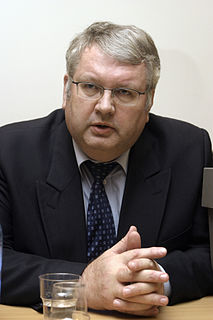The early details of the history of the Faroe Islands are unclear. It is possible that Brendan, an Irish monk, sailed past the islands during his North Atlantic voyage in the 6th century. He saw an 'Island of Sheep' and a 'Paradise of Birds,' which some say could be the Faroes with its dense bird population and sheep. This does suggest however that other sailors had got there before him, to bring the sheep. Norsemen settled the Faroe Islands in the 9th century or 10th century. The islands were officially converted to Christianity around the year 1000, and became a part of the Kingdom of Norway in 1035. Norwegian rule on the islands continued until 1380, when the islands became part of the dual Denmark–Norway kingdom, under king Olaf II of Denmark.
The politics of the Faroe Islands a "constituent country" of the Kingdom of Denmark, function within the framework of a parliamentary representative democratic dependency, whereby the Prime Minister of the Faroe Islands is the head of government, and of a multi-party system. The Faroe Islands are politically associated with the Kingdom of Denmark, but have been self-governing since 1948. Executive power is exercised by the government. Legislative power is vested in both the government and the Løgting. The judiciary is independent of the executive and the legislature and the responsibility of Denmark. As of October 25, 2007, the Faroe Islands became one electoral district.
This is a timeline of Faroese history comprising important legal and territorial changes and political events in Iceland and its predecessor states. To read about the background to these events, see history of the Faroe Islands.
Sjálvstýri is a liberal and autonomist political party in the Faroe Islands. It is currently led by the Mayor of Klaksvík Jógvan Skorheim.
There are three types of elections in Denmark: elections to the national parliament, local elections and elections to the European Parliament. Referendums may also be called to consult the Danish citizenry directly on an issue of national concern.

Republic, formerly known as the Republican Party is a left-wing political party in the Faroe Islands committed to Faroese independence.

The Social Democratic Party is a social-democratic political party in the Faroe Islands, led by Aksel V. Johannesen.

The Faroese People's Party – Radical Self-Government is a pro-Faroese independence conservative and conservative-liberal political party in the Faroe Islands, led by Jørgen Niclasen. One of the four major parties, it has had eight seats in the Løgting since the 2011 election, making it the joint-largest party, but it has neither of the Faroes' seats in the Folketing.

Anfinn Kallsberg is a Faroese politician, former prime minister, and the former leader of the People's Party. First elected to the Faroese parliament in 1980 and consecutively since then, Kallsberg served as Fisheries Minister from 1983 to 1985 and for 5 months in Jógvan Sundstein's first coalition government in 1989, and as Economics and Finance Minister from 1996 to 1998 in a coalition led by Edmund Joensen.

Lesbian, gay, bisexual, and transgender (LGBT) rights in the Faroe Islands are relatively similar to that of Denmark. The progress of LGBT rights has been slower, however. While same-sex sexual activity has been legal in the Faroe Islands since the 1930s, same-sex couples never had a right to a registered partnership. In April 2016, the Løgting passed legislation legalizing civil same-sex marriage on the Faroes, recognizing same-sex marriages established in Denmark and abroad and allowing same-sex adoption. This was ratified by the Folketing in April 2017. The law went into effect on 1 July 2017.
General elections were held in the Faroe Islands on 19 January 2008, the latest possible date. The Self-Government Party and the Centre Party gained a seat each while the Social Democratic Party lost a seat. The number of women went from three to seven.
Same-sex marriage in the Faroe Islands, an autonomous country within the Kingdom of Denmark, has been legal since 1 July 2017. Legislation allowing civil same-sex marriages and adoptions was approved by the Løgting on 29 April 2016. The Danish Parliament approved the necessary legislative adaptations on 25 April, and the law received royal assent on 3 May 2017 and went into effect on 1 July 2017.

Jóannes Patursson was a Faroese nationalist leader and poet. He served as a member of the Parliament of Denmark and the Parliament of the Faroe Islands.
Early general elections were held in the Faroe Islands on 29 October 2011. Faroese law states that new elections must be held at least once every four years; however, either the Prime Minister (Løgmaður) or a majority of the members of the Faroese Parliament may call an election before the end of this period. The previous elections having been held on 20 January 2008, the latest date on which the next elections could have been held was 19 January 2012. However, the Prime Minister of the Faroe Islands, Kaj Leo Johannesen, announced on 27 September 2011 that elections would be held on 29 October 2011. He gave no particular reason for his decision.
Progress is a liberal and pro-Faroese independence political party on the Faroe Islands.

Kristin Michelsen is a Faroese politician.












